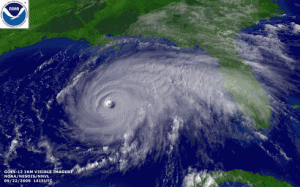HurricanesHurricanes are worse – whether you believe it depends on experience, gender, and politics
Objective measurements of storm intensity show that North Atlantic hurricanes have grown more destructive in recent decades. But coastal residents’ views on the matter depend less on scientific fact and more on their gender, belief in climate change, and recent experience with hurricanes, according to a new study.

Hurricane Katrina enroute to New Orleans // Source: noaa.gov
Objective measurements of storm intensity show that North Atlantic hurricanes have grown more destructive in recent decades. But coastal residents’ views on the matter depend less on scientific fact and more on their gender, belief in climate change, and recent experience with hurricanes, according to a new study by researchers at Princeton University, Auburn University-Montgomery, the Louisiana State University, and Texas A&M University.
Princeton University says that the researchers plumbed data from a survey of Gulf Coast residents and found that the severity of the most recent storm a person weathered tended to play the largest role in determining whether they believed storms were getting worse over time, according to the study published in the International Journal of Climatology. The survey was conducted in 2012 before Hurricane Sandy, the second-most expensive hurricane in history, caused $68 billion in damage.
Respondents’ opinions also strongly differed depending on whether they were male or female, whether they believed in climate change and whether they were a Democrat or a Republican. For instance, people who believe in climate change were far more likely to perceive the increasing violence of storms than those who did not. The researchers noted that because climate change has become a politically polarizing issue, party affiliation also was an indicator of belief in strengthening storms.
“Understanding how people in coastal regions perceive the threat is important because it influences whether they will take the necessary actions to address that threat,” said Ning Lin, the senior researcher on the study and a Princeton assistant professor of civil and environmental engineering.
“What you see is that there is often a gap between the reality of the storm trends and how people interpret those trends,” said Siyuan Xian, a doctoral candidate in Lin’s lab and co-lead author of the new paper.
While scientists continue to debate the impact of climate change on the frequency and strength of hurricanes, numerous studies of objective measures — such as wind speed, storm-surge height, and economic damage — show that hurricanes are stronger than they were even a few decades ago.
For instance, eight of the ten most economically damaging hurricanes since 1980 have occurred since 2004, according to the National Oceanic and Atmospheric Administration (NOAA). In constant dollars, Hurricanes Katrina (2005) and Sandy caused nearly $154 billion and $68 billion in damage, respectively, according to NOAA.
